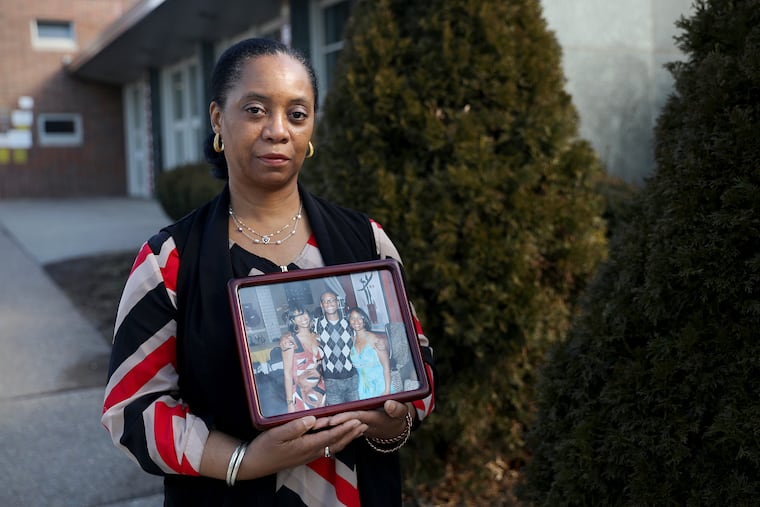Trump insisted no troops were seriously injured in Iraq, but a Philly vet’s final words show the true cost of war | Helen Ubiñas
Every day, about 20 veterans, active-duty service members and members of the National Guard and Reserve, die by their own hands.

It’s been six weeks since Rosalind Williams’ 30-year-old son, Army veteran Corey Michael Hadley, took his own life.
When grieving the death of a child, that’s a moment. A blink of an eye, a flip of a calendar. Barely enough time for Williams to pick herself up and return to her Northeast High School classroom where she teaches science.
And yet in that small window, 900 other military parents have been dealt the same blow — left behind to try to find the rhythm of a life that they’ve lost after losing their children to suicide. According to the most recent data from the Department of Veterans Affairs, about 20 veterans, active-duty service members and members of the National Guard and Reserve, die by their own hand every day.
In the quiet that followed the initial flurry of collective shock and grief after his death on Jan. 2, Williams sat with her anguish. She went through old photographs, collected new ones from his funeral and military interment. She read, and reread, the numerous news stories written about her son after the family spoke unsparingly about his death.
“His wounds were slow-acting and invisible, but nonetheless crippling and fatal,” the family said in a statement that spoke of his struggles with depression and PTSD after six years and three tours of duty in Iraq and Afghanistan.
Just as she did when she and the family struggled to find the right way and words to describe the loss of her son, Williams has continued to consider the cause of his death. His PTSD and the mental-health issues that medicines and other interventions failed to help — those were merely symptoms, torturous as they were, of what really ailed him. Instead, his mother believed: What finally cost him his life was the traumatic brain injury he suffered after the Army sharpshooter’s multiple deployments. Even in his final letter to his family, which she read aloud to me at her dining-room table, he spoke about it.
“I’m so sorry for doing this to you,” Hadley wrote. “I am so grateful to have been born into a loving, strong family.
"Sadly I’m not as strong as you may think I am. I have endured for as long as I could. My brain feels as though it’s swelling within my head. My ankles do not support my weight causing me to lose balance often and my heart ... my heart feels as though there is a black hole in the center of it sucking in all positive emotions allowing them to never leave and me never truly feeling happiness.”
Hadley’s family knew his mental health had deteriorated after the infantryman and sharpshooter returned home in 2013. But the wounds he and so many others experience remain invisible to many, including the president of the United States.
In January, Trump announced that “no Americans were harmed” when Iran fired over a dozen ballistic missiles at U.S. and coalition forces in Iraq. Even after the Pentagon said 34 U.S. troops were diagnosed with concussions or traumatic brain injury following the attack, he downplayed the injuries and said compared with “people with no legs and no arms,” they were “not very serious injuries.” He only doubled down after it was recently announced that 109 U.S. troops were diagnosed with mild traumatic brain injury from the attack.
“I won’t be changing my mind on that," he said during an interview with Fox Business.
Veterans advocates, led by the 1.6 million-member Veterans of Foreign Wars, demanded a presidential apology.
Editorial boards called Trump’s comments a cruel reflection of lingering ignorance on how to treat service members of “the signature wound” of America’s 21st-century wars. Since 2000, more than 400,000 troops have been diagnosed with versions of traumatic brain injury, many of them as a result to being exposed to blasts.
The father of Ryan Larkin, a Navy SEAL in Iraq and Afghanistan who took his life at 29 at his parents’ home in 2017, wrote a letter to Trump about the “invisible wounds” his son sustained. Frank Larkin stood beside Trump last year when the president signed an executive order to prevent veteran suicides.
He called the president’s comments a “hard hit to the gut."
Williams has some choice words, too. But her focus now is on honoring her son by trying to save other men and women who so valiantly fight — and die — for a country that mostly just gives lip service to supporting its troops.
“Leaving you for the fourth and final time is incredibly hard," Hadley wrote in that final letter to his family. "Know that at my end I am finally able to find peace.”